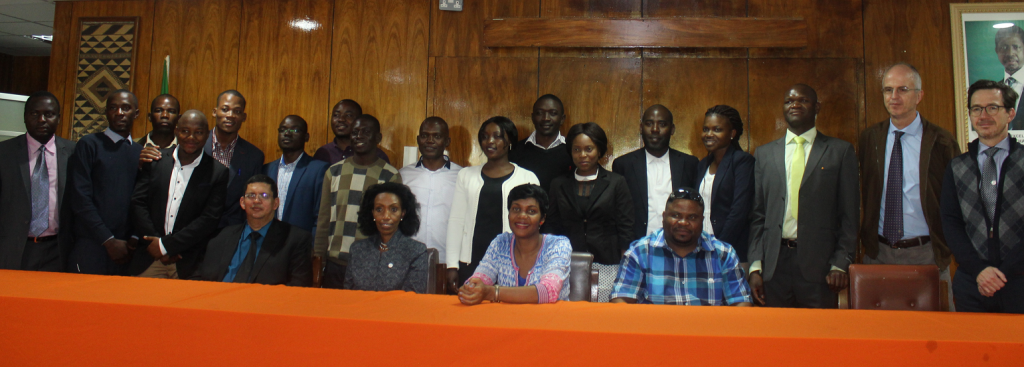The launch of the SASSCAL sponsored Master of Geoinformation Science and Earth Observation (SASSCAL Task 303) was held on 6 June 2017 in the Vice Chancellor’s senate chambers of the University of Zambia (UNZA) in Lusaka, Zambia.
In attendance were the guests of honour Prof Luke Mumba, Vice Chancellor UNZA, First Secretary of Angola Embassy, Mrs Jane Chinkusu the SASSCAL Board Chairperson, Dr Jane Olwoch SASSCAL Executive Director, and the Permanent Secretary of the Ministry of Higher Education, Owen Mugumezulu.

Attendees of the MSc Launch in Zambia
Others in attendance included the Deputy Acting Vice-Chancellor of the University of Botswana (UB), students who are recipients of scholarships, representatives from the Namibia University of Science and Technology (NUST), Dean of the School of Natural Sciences UNZA and other UNZA representatives, representatives of Cape Peninsula University (CPUT), SASSCAL National Directors, SASSCAL Director of Science and Technology, SARUA, principal investigators , senior research officers, and representatives of media houses.
In his opening remarks, Prof Luke Mumba stressed that the programme being launched was important as it responds to the needs and challenges that the region faces. The challenges caused by climate change such as droughts that impact on agricultural productivity and food security cannot be over emphasised. Prof Mumba said that the MSc programme was important as it will help nurture experts who will be able to develop strategies to curb the effects of climate change by way of mitigation, monitoring of the environment and developing early warning systems.
In addition, Prof Mumba said that the SASSCAL Task 303 presented an opportunity for the region to demonstrate its value in contributing to the common agenda for Africa through collaborative efforts. He further stressed that this collaborative effort will benefit the entire sub-region, and that the initiative corresponds with the objectives of the strategic plan of UNZA in as far as it strives to internationalise the institution and create partnerships. He commended the efforts made to develop the Master programme. He was confident that trainees under this programme will make meaningful contributions to the region. Lastly, he thanked the German Government (BMBF) for the funding support rendered through SASSCAL.
The programme proceeded with a speech and official handover of the MSc Programme by Mr Owen Mugumezulu, the Permanent Secretary of the Ministry of Higher Education. The Permanent Secretary thanked UNZA’s partner universities for developing the post graduate programme, the BMBF for funding the initiative and the SASSCAL African partner countries for hosting the initiative. He remarked that climate change was no longer a tale but a reality, and that this was felt in the high average temperatures that impact negatively on the region. He also mentioned that such important initiatives will assist the governments in taking informed decisions. Mr. Mugumezulu stressed that Zambia will continue to make efforts in advancing science and technology. In conclusion, he said that such programmes need properly trained and qualified human resources as well as appropriate infrastructure to bridge the existing capacity gaps in areas such as earth observation, GIS, remote sensing, health, disaster preparedness, and others.
Mr Frikkie Louw, Principal Investigator for the SASSCAL Task 303 gave an overview of the task and the steps undertaken in developing the MSc programme. Mr Louw reported that the development of the MSc course has come a long way, involving a number of workshops in partner countries, curricular development and the signing of collaborative agreements with the four universities. Mr Louw said that from the time the programme was launched at NUST in November 2016, there has been a great interest in other SASSCAL partner countries for the programme to be launched in all the SASSCAL partner countries. Mr Louw was delighted to mention that the course is equally represented in terms of gender as more than 50% of enrolment are female students. In conclusion, he informed all that preparatory steps have been taken to launch the programme in Botswana before the end of the year.
In her remarks, Prof Marshall Sheldon, the Dean of the Faculty of Engineering from CPUT , assured partners that CPUT is still committed to the project, and that a similar launch is anticipated in the next two years. Mr Lameck Mwewa, former Dean of the Faculty of Natural Resources and Spatial Sciences at NUST highlighted four important aspects. Firstly, the importance of academic transformation that is critical to address the needs of modern students, especially in an ever changing and challenging world. Secondly, there is need for a strong collaboration in research, which will serve as a driving force in revenue generation and an attraction for top academic talent. Thirdly, Mr Mwewa read that student centeredness is a priority in higher education as it presents students with unique opportunities, freedoms and responsibilities. Finally, he mentioned that the programme will enable students to be exposed to international experience through academic exchange programmes. In conclusion, he stressed the importance that administrative processes play in facilitating collaboration. Such a collaborative programme could only have materialised because proper administrative systems are in place.
In his remarks, Prof David Sebudubudu, Acting Deputy Vice-Chancellor Academic Affairs of UB, was optimistic that the programme will be launched in Botswana in the near future, and stressed that he will make sure that UB is part of such an initiative. He appreciated all those who took part to make the programme launch a reality and thanked the funders for the support. He further advised the students to make use of the golden opportunity presented to them.
Dr Jane Olwoch, SASSCAL Executive Director, expressed delight to be part of the launch of the MSc programme, a course that has attracted over 14 students. Dr Olwoch said that the course was launched at a time when Africa was experiencing a number of challenges, high levels of poverty, unemployment and severe impacts of environmental change. She mentioned that the drastic changes in climate are observed in unexpected rains, flooding, high rates of malaria infections, re-emergence of agricultural pests, etc. These challenges are transboundary and cannot be ignored. It is for this reason important to develop programmes that have a regional focus. The new technologies embedded in the programme will eventually provide the much-needed information for adaptation strategies, and better understanding of the environment for informed decisions. Dr Olwoch mentioned that earth observation was important for Africa and in particular important for space agencies, the African space policy and strategy as well as for the African Union Agenda 2063.
The SASSCAL Board Chairperson, Mrs Jane Chinkusu, said that human capacity development was one of the most important tasks being implemented by SASSCAL. Mrs Chinkusu said that the level of support received under SASSCAL was substantial and she stressed the need to take advantage of the opportunity to advance research in the sub-region.
In closing the launch, the Dean of the School of Natural Sciences from the UNZA, Dr Habatwa Mweene, presented a vote of thanks.




